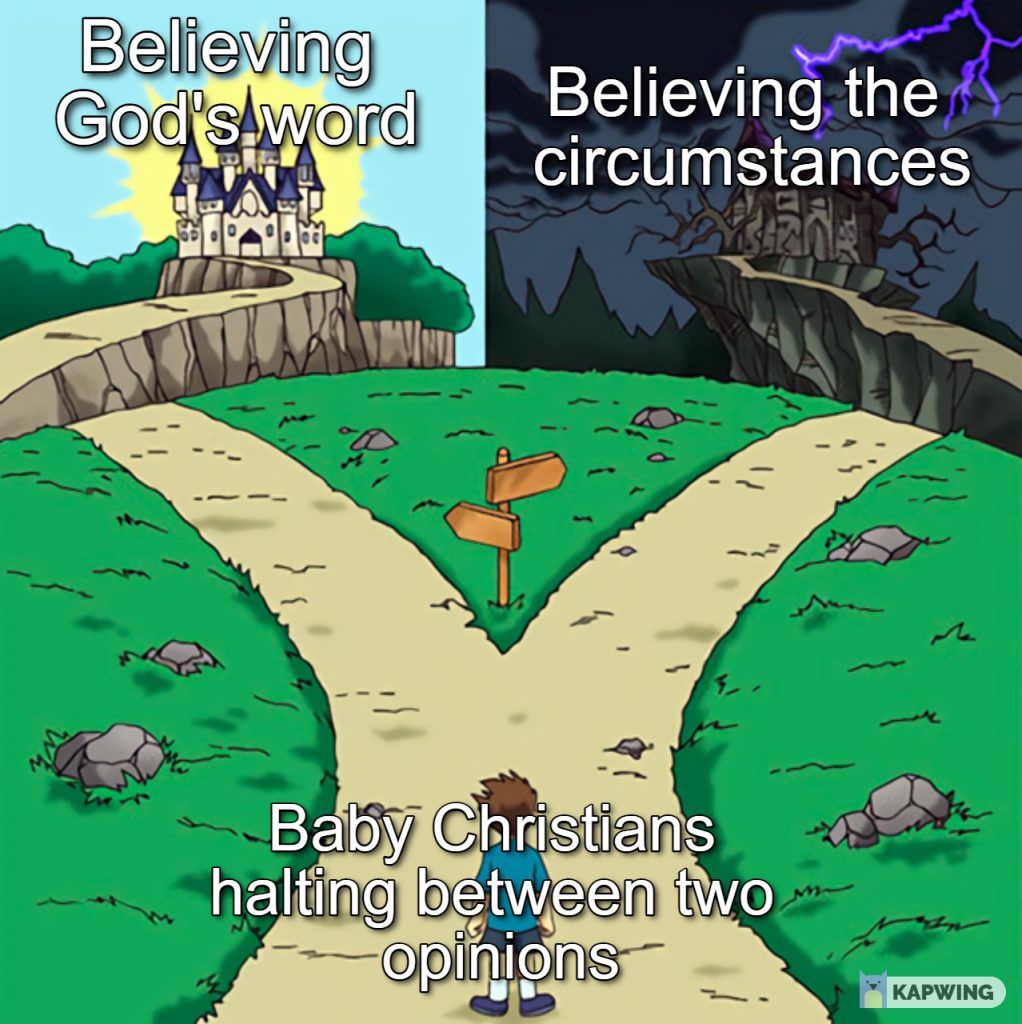
Hello and welcome, my fellow Gods, to perhaps the most intense article yet
As Christians, it’s given to us to understand how the kingdom of God functions and if we apply these things, we could produce tremendous results not only in our own lives, but in the lives of others around us too.
If you’re going to start functioning at a higher measure than you have been and move to an even higher level in your life, then you will have to learn to see things the way that God sees things. We are children of God and therefore must see the way God sees. You must learn to look beyond what is manifest and visible.

In our previous article in this short series, we brushed over how that faith is a law; if that sounds unfamiliar, it’s perhaps we because we defined it this way: sin is the transgression of the law and as Christians, anything that is not of faith that works by love is sin. So faith is therefore a law.
Let’s explore this more directly from the scriptures,
“Where is boasting then? It is excluded. By what law? of works? Nay: but by the law of faith.”—Romans 3:27
So, we know for certain now that faith is a law in our heavenly kingdom. See now why anything that is not of faith is sin? Because faith is a law therefore, not operating by faith is a crime i.e., a sin. Since this indeed is the case, it means we must understand in greater detail what faith is.
Next time you ever hear someone ask something like why God can’t just do something for them without this need for having faith, this is the reason: faith is a law.

It’s like asking why someone can’t just walk to school without the law of gravity—gravity is one of the four fundamental laws of the universe next to electromagnetism, strong nuclear forces, and weak nuclear forces—these are the four fundamental laws of the universe that govern how our universe operates on a physical standpoint. Similarly, faith is a law in the celestial realm. Paul makes a striking statement once,
“But without faith it is impossible to please him…”—Hebrews 11:6
Why does Paul say this? Because faith is a law in our kingdom. In the natural world, there are laws which we have understood and taken advantage of for our benefit. For instance,
- The law of gravity: due to our understanding of this law, we put satellites in space that allow for global communication, the internet, etc.
- The law of electromagnetism: due to our understanding of this law, we have electricity, motors, generators, transformers, speakers, MRI machines, etc.
- Strong and Weak nuclear forces: due to our understanding of these laws, we went subatomic and birthed chemistry and nuclear physics—we can manipulate matter into its various states.
Now this is in the natural world. It’s the same thing in the kingdom of God: if we took advantage of this law of faith, we could do much more with our lives and the lives of people around us. Without faith, you cannot make progress in the realm of the spirit. Without faith, you cannot achieve anything in the realm of the spirit. See now why many “strong” Christians are still broke, poor, weak or powerless? Because what determines your state in the realm of the spirit (and subsequently in the heavenly city of Christ) is the law of faith.
Understanding the law of faith and how it works is so important. I will use this moment to inform you that I do have a dedicated article series on understanding faith so even though I will go over some in-depth detail in this article, keep in mind that we will dive deeper into the subject of faith.
So, then what is faith? How do we use faith in the same ways that we take advantage of the laws in the natural world?
What is Faith
The very best definition we could ever get is from the book of Hebrews,
“Now faith is the substance of things hoped for, the evidence of things not seen.”—Hebrews 11:1
No dictionary has ever even come close to perfectly defining what faith truly is as well as this does, and it makes sense why—because the scriptures are books of faith. Faith is the response of the human spirit to the word of God—its’ a spiritual thing thus it cannot be defined through the natural mind. Let’s read further,
“For by it the elders obtained a good report.
Through faith we understand that the worlds (Greek: aions) were framed (Greek: katartizo) by the word (Greek: Rhema) of God, so that things which are seen were not made of things which do appear.”—Hebrews 11:2-3
Let’s pause for a moment and discuss the underlined statements.
First is the word “world”. The Greek word translated “world” in that place is “aion” which means an age, a dispensation, a course of life. Bear in mind we will discuss this specific topic in much greater detail later but for now bear with this.
Second is the word “framed” which was translated from the Greek “katartizo” which means to render, repair, shape, put together, or to complete.
Finally, we have the word “word” which is the Greek “Rhema” which means the spoken word of God. What we are reading now is the Greek “logos” of God meaning the written word of God. But when you speak the logos of God, it becomes Rhema. Bear with me on this one, we’ll discuss in detail in this same article series in a moment.

Putting all this together, what do we have as an example of what faith is and what it has been used for in history? Through faith we understand that the age, dispensation, or course of life was rendered by the spoken word of God. Get it now? Meaning you can shape your own world by speaking the word of God. Doing that is what is classified as faith. You can shape what’s going to happen in your own life and in your own world through faith by speaking the word of God.
You see, God has a course of life for everyone of us and He has prepared it in advance for us to walk in that course of life. But just because God has prepared it does not mean we will automatically get into that course of life because we are all free moral agents who have free will and can choose not to walk in that course. There are people who are in relationships they should have never been in; or in jobs they should never be in; or in houses they should never be in; or around people they should never have met. This is why so many people have problems in their lives—they are just where they should never have been. Their aions were not framed and they let things just happen.

Have you ever heard the saying “whatever will be will be”? That’s very wrong because its like a farmer who buys a large chunk of land and even though he loves the farm and wants to take care of it, he still chooses to say, “whatever will grow in this farm will grow”. What do you think will grow there? Weeds! The scriptures say,
“…whatsoever a man soweth, that shall he also reap”—Galatians 6:7
He didn’t say whatever sows itself meaning you are responsible for what you sow and what you reap—not God or life or anyone else other than you.
You must take care of your farm—it’s a deliberate action. You must frame your aion by speaking the things that you want into being. Let’s take a look at how to do so in the next section.

The Principal of Faith
So far, we’ve taken a brief look at what faith is and have a brief description on it. Now, the more important thing that follows is how does the principal of faith work? How does it operate? Let’s take a look at it from the scripture. What I would like for you to notice as we read through these scriptures is how Abraham was given the world, how he received it, and how we come into play.
“For the promise, that he should be the heir of the world…”—Romans 4:13
I’m just going to stop right here for a moment because I want you to notice something just on this portion before we proceed. Did it ever occur to you that God actually gave the world to Abraham? God creates the world with everything in it, and then decides to give all of it to Abraham which means everything that you see around you—from the mountains, clouds, trees, animals, everything—legally belongs to Abraham. Take a moment to think about that.
The beautiful thing about this reality is that God gave the world to Abraham and his seed (you’ll see it in a moment). So, what does that mean? That God gave the world to me—I own the world legally. If you think I’m simply making this up then consider the scripture below,
“If you belong to Christ, then you are Abraham’s seed, and heirs according to the promise”—Galatians 3:29

I’ll leave it up to you to reason out whether we belong to Christ. If you still debate this then chances are you are new and haven’t read through previous articles in which case, I recommend you do so as soon as right now, starting with Who and What a Christians Really Is. Let’s continue reading from Romans 4,
“For the promise, that he should be the heir of the world, was not to Abraham, or to his seed, through the law, but through the righteousness of faith.
For if they which are of the law be heirs, faith is made void, and the promise made of none effect:
Because the law worketh wrath: for where no law is, there is no transgression.
Therefore it is of faith, that it might be by grace; to the end the promise might be sure to all the seed; not to that only which is of the law, but to that also which is of the faith of Abraham; who is the father of us all,
(As it is written, I have made thee a father of many nations,) before him whom he believed, even God, who quickeneth (meaning “makes alive”) the dead, and calleth those things which be not as though they were.”—Romans 4:13-17
I’ll pause right here so that we take a look at a few things together, particularly the things I have underlined for you. First thing’s first, we just saw how that God “quickeneth” the dead. That means to make alive the dead (whether a dead body, situation, opportunity, anything). What does this translate to? That it’s never too late with God.
Secondly and more importantly in this context, he says God calls those things which be not as though they were. This is the principal of faith. This is how to use faith; therefore, we’ll decipher this a little bit more. What’s Paul telling us here? That God calls those things which don’t exist as though they already exist. For instance, when He says, “Let there be light”, there was no light before, but at the sound of that command, light became! So, he called light to become from nothing; he called that which did not exist as though it already existed.
The better example is in the very same scripture we were from reading in; the very first thing I had underlined for you where he says God said to Abraham “I have made you a father many nations”. He said this to Abraham before Abraham even had his first son. At this point, Sarah was still baren, but God spoke to Abraham in the past tense when he says, “I have made you…”, not “I will make you”. See what God did there? He called that which didn’t exist as though it already existed. That is the principal of faith. That’s how to use faith from our own Father and creator.
Faith is calling real that which you cannot see.
Thirdly and possibly finally on the principal of faith, did you notice that he did not say God calls those things that be as though they were not? Or put simply, God calls those things that already exist as though they do not exist. Did you notice that he didn’t say that? Hard to understand, right? Let’s put it in a more practical sense,
Someone has a cancerous growth on or in their body, right? To heal this person, God would not say “that tumour does not exist anymore”; which is to say, God does not call the tumour as though it does not exist. Rather He would call healing into existence.
Faith is calling things into existence, not out of existence. In the above case of a cancerous growth, the tumour exists thus you are supposed to call healing into being and not calling the cancerous growth out of being. Similarly with wealth, a fellow wants to change his financial situation and become wealthy. It would be the wrong application of faith to say, “I am not broke” or “this brokenness does not exist”, rather it is correct to call wealth into being i.e., “I am wealthy” or “wealth comes to me.” See how the principal of faith works? This is why many times, people who try to exercise faith fail, because they have trouble telling the difference in how to speak.
The Characteristics of Faith
Now that we’ve taken a brief look at the principal of faith, we can look at the characteristics of faith to better understand. We’ll continue reading on from the same chapter,
“Who against hope believed in hope, that he might become the father of many nations, according to that which was spoken, So shall thy seed be.”—Romans 4:18
In the case above, Abraham had received this blessing by faith by accepting the promise of God. How did he do that? By believing in hope even against hope. What does that mean? The situation looked hopeless for Abraham: Sarah was not just barren but also passed menopause, both were old, and Sarah’s womb was already dead, yet even so Abraham still believed in the hope of that promise that God made to him. Even though outwardly, the situation looked hopeless, Abraham believed in hope. So, keep that in mind when it comes to the first characteristic of faith: believing in hope even against hope. Let’s read further,
“And being not weak in faith, he considered not his own body now dead, when he was about an hundred years old, neither yet the deadness of Sarah’s womb:”—Romans 4:19
Weak faith considers the visible circumstances. You consider all those who are in competition with you and think to yourself that you stand no chance against them. Or you consider how far developed the cancer is in your body and think you stand no chance of surviving it. Weak faith considers the circumstances. But Abraham shows us how it’s done. Even in the face of all these circumstances—the deadness of his wife’s womb, the old age of both of them, the barrenness of Sarah—Abraham did not consider them at all. That’s another characteristic of faith: it does not consider the visible circumstances. Let’s read further,
“He staggered not at the promise of God through unbelief; but was strong in faith, giving glory to God;”—Romans 4:20

See that? Weak faith staggers, meaning one moment it believes and the other moment he does not believe. An example that comes to mind is during the time when the children of Israel kept switching between worshipping God and worshipping Baal until Elijah confronted them and asked,
“How long will you waver between two opinions? If the LORD is God, follow him; but if Baal is God, follow him”—1 Kings 18:21

That’s what weak faith does: halting two opinions. One moment you believe one thing and the next you believe the opposite. An example is of the guy trying to receive healing from a cancerous growth, one moment he says, “I receive healing in Jesus’ Name”, and the next moment he looks at the situation and says, “Oh God, please take this thing away”, going back and forth between speaking healing and begging for it from God. Faith does not stagger. That’s another characteristic of faith—it does not stagger.
Next it says Abraham was strong in faith, giving glory to God. Faith gives glory to God. How do you do that? You testify. You proclaim it boldly that God has done it for you; that you have received your healing. I love the example of faith the scriptures give us when it says,
“…they overcame the devil by the blood of the lamb and the word of their testimony;…”—Revelations 12:18
See the confidence you need to have in the word to make faith work? You must go all out irrespective of the way things look. You testify. You give glory to God. That’s the characteristic of faith. Let’s proceed with the final characteristic of faith,
“And being fully persuaded that, what he had promised, he was able also to perform.”—Romans 4:21
Need I even say more? To make faith work, you cannot be anything other than fully persuaded. You have to believe in it as much as you believe in gravity or electricity. You cannot be 99% persuaded or anything less than 100% persuaded. You need to be fully persuaded by it. When you call healing into existence, are you fully persuaded? When you call a job into existence, are you fully persuaded? When you call wealth or success, are you fully persuaded? Abraham, in the face of all that opposition, was still fully persuaded that what God promised, He was able to deliver. We spoke about the importance of being fully persuaded in our last article on the concept of sin—same principal applies here too. You need to be fully persuaded. That’s why Abraham could not stagger—this guy was fully persuaded. It didn’t matter what thoughts came to his mind or what other people said or what the situation looked like, the guy was fully persuaded that God’s promise would be delivered.
When it comes to faith in the church of Jesus Christ today, this is by far one of the biggest problems with God’s children that traps them in being children and never growing up into maturity—being unpersuadable. That’s unbelief. When even the word of God could not persuade them. Think about it this way: you have been following these article series from the very first until now because you were persuaded, not by my words, but by the word of God that I share. I present the word as it is in the Bible directly to you to research even for yourself. You chose to be persuaded. Are you aware that there are others who read these things and even though they are directly found in the Bible, they still refuse to be persuaded? That’s why they remain children and that’s why a lot of them end up in problems that God does not help them out of.
In case you are in that situation and are thinking what you could do if you are in a situation where you not fully persuaded and are staggering when working out your faith, the solution to this is simple: read or listen to the word of God like your are listening now because you have to feed your faith on the ability of God and make up your mind that you are going to win no matter what.
The Application of Faith
In the earlier section our current discussion, I mentioned how that we could frame our aions through rhema. So how do we do that practically?
“Let your conversation (manner of life) be without covetousness; and be content with such things as ye have: for he hath said, I will never leave thee, nor forsake thee.
So that we may boldly say, The Lord is my helper, and I will not fear what man shall do unto me.”—Hebrews 13:5-6
Now I know you probably missed that from the onset so let me explain it. He says God has said ‘I will never leave you nor forsake you’ so that we may boldly say ‘the world is my helper…’; Let me reiterate that even further so its clearer. He’s saying that God has said whatever He’s said so that we may boldly say what God has said. So, when we remove the quotation marks around what God has said and what we have said in Paul’s example above, what remains is,
“For He (God) has said… so that we may boldly say”
Let me put it in proper context for you: the scriptures have alluded to the fact that our lives are like buildings; and these buildings are built by words. Now Paul here gives us the principal for constructing these buildings when he tells us that God has said whatever He’s said so that we can boldly say… And what we say should be as a result of what God has said. He’s telling us the reason for these scriptures. He’s telling us that the reason for these scriptures—the reason for the Bible—is not just so that you can understand somethings and feel good or be aware of these things. The reason for the scriptures is so that you can say things as a result of what God has already said!
Look, everything that God has said in the scriptures is called logos. Logos means the written word of God. But when you take that logos (that written word of God) and speak it forth with your mouth, it is no longer Logos but rather it becomes Rhema! Rhema is the spoken word of God that carries with it Dunamis! When you take Logos and speak it forth, you release Dunamis. That’s what Rhema is—it is the re-echoed word of God that is spoken, and by virtue of it being spoken, propagates Dunamis which means the dynamic ability to effect changes. Do you see how much power you carry in your mouth? Do you see why God wants you to speak the word and not just know it? Because when the word is in the written pages, it carries no consequence on your life; when it’s in your mind; it carries not consequence on your life; but when it is spoken forth, it generates with it Dunamis. So, when the scriptures say, “ye are Gods and all of you are children of the Most High”, your response to it is to boldly proclaim with your mouth that “I am a God because I am a Child of the Most High!”
Rhema is the spoken word of God that has to do with your current and present situation. Logos is the general word of God, but Rhema is cut out from Logos for a specific situation in the now.
So, now consider our earlier scripture,
“Through faith we understand that the aions were framed by the Rhema of God, so that things which are seen were not made of things which do appear.”—Hebrews 11:3
Do you see what this means now? You frame your world with Rhema meaning you speak forth what you want your world to be like.

This is how you apply faith in your daily life.
Conclusion
It’s hard not to get excited by these teachings when so much truth is being revealed and spoken about. Faith is one of the most important concepts in the kingdom of God and sadly, not many people have understood it. Until now. Things are changing. I have a planned article series where we look at faith at an even deeper level than this to a point where the physical and spiritual intertwine so that you see for yourself exactly how the word affects the natural realm.

If I am to conclude this article, then let it be this way: If you are not Christian then none of this can apply to you no matter what you try. And this is not me saying this, Jesus Himself says it,
“Jesus saith unto him, I am the way, the truth, and the life: no man cometh unto the Father, but by me.”—John 14:6
There is no other way to have this except by becoming Christians. Christianity is not just a religion. Read everything we’ve taken a look at from our very first article series on Who and What a Christian Really is for yourself to know what a Christian is. If you are here and haven’t given your life to God (and therefore aren’t Christian) then I offer you the opportunity to give your life to God.
Simply believing in God and in Jesus DOES NOT make you Christian.
“That if thou shalt confess with thy mouth the Lord Jesus, and shalt believe in thine heart that God hath raised him from the dead, thou shalt be saved.“—Romans 10:9
Paul tells us exactly how to become Christian. He says you need to believe that God raised Jesus from the dead, and you need to confess with your mouth that Jesus Christ is Lord. If you have never done this then you have not Christian no matter how often you go to church and no matter how good a person you are. So, right now, if you’re reading this and wish to give your life to God and become a Christian, repeat this prayer below out-loud to yourself wherever you are,
“O Lord, God,
I believe with all my heart in Jesus Christ, Son of the living God.
I believe He died for me and God raised Him from the dead.
I believe that He’s alive today.
I confess with my mouth that Jesus Christ is the Lord of my life from this day.
Through Him and in His Name, I have eternal life; I am born again.
Thank you, Lord, for saving my soul!
I’m now a child of God. Hallelujah!”
Now if you said that prayer for the very first time and gave you life to the Lord today, congratulations: you are now a new creation! You are born again! And you are child of God from this day. Please, please, please reach out to me directly using my contact form or on the numbers given below and I will respond to you immediately: I have amazing gifts lined up just for you and I wish to help you through your Christian walk. Feel free to read my article series on Who and What A Christian Really is to learn more about who you are as a Child of God, what it means to be a child of God, and what you have as a child of God.
Leave a Reply

Cape Town
Inside My World

Inside My World
Selected by Venancio




0 Comments